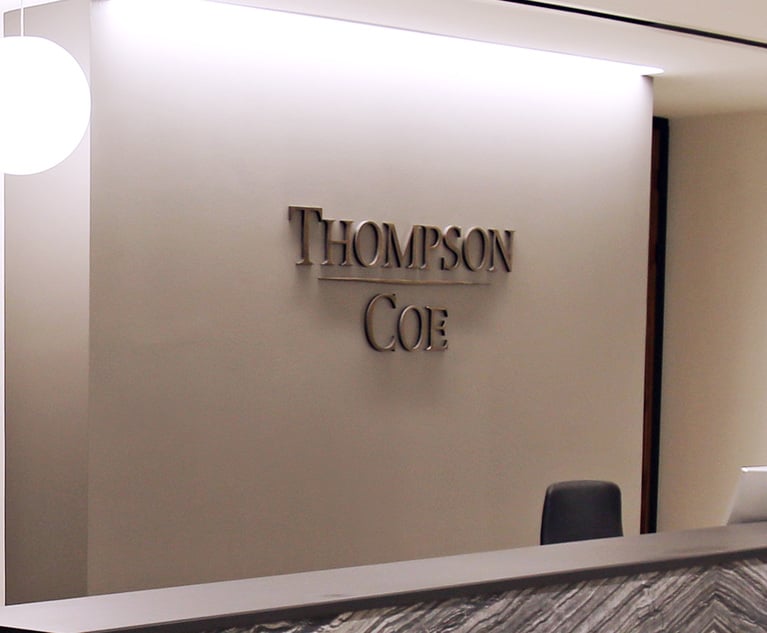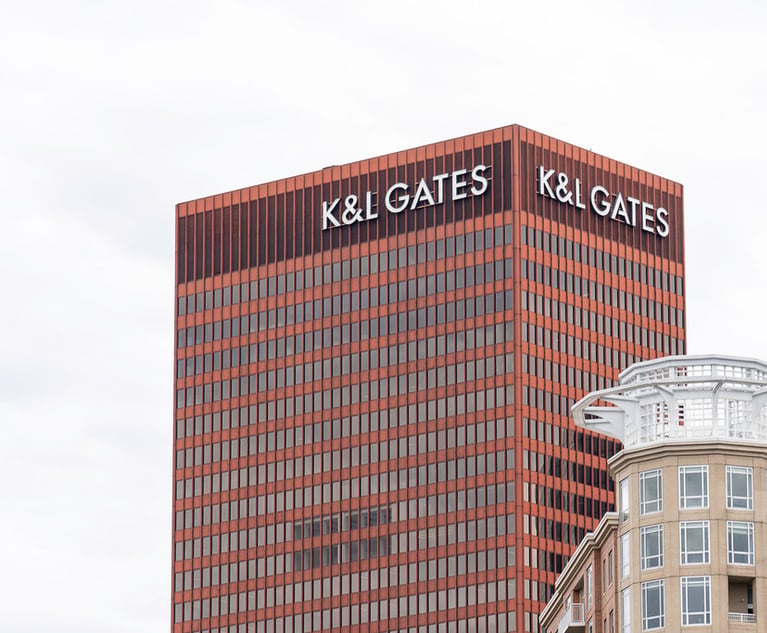Butler Snow Moves for Arbitration in Lawsuit Over Ponzi Scheme
The firm, while publicly downplaying its connection to Ponzi schemer Arthur Lamar Adams, is trying to force a related lawsuit into arbitration.
January 25, 2019 at 07:10 PM
4 minute read

The Butler Snow law firm and the firm's founder and CEO, Matt Thornton, have moved to force arbitration in response to the claims brought by Alysson Mills, the court-appointed receiver for admitted Ponzi schemer Arthur Lamar Adams and his company, Madison Timber Properties.
Meanwhile, Butler Snow, in a statement, is denying the allegations and downplaying its connection to Adams and his disgraced business.
Mills' lawsuit, filed Dec. 19 in Mississippi federal court, targets Butler Snow, its advisory arm, its CEO, as well as Am Law 100 firm Baker, Donelson, Bearman, Caldwell & Berkowitz; Brett Alexander, a senior public policy adviser and lobbyist in Baker Donelson's Jackson, Mississippi, office; Jon Seawright, an attorney and shareholder in the Jackson office; and Alexander Seawright LLC, an investment vehicle run by the latter two individuals.
Mills, an attorney in the New Orleans office of Fishman Haygood, and her colleague Brent Barriere claim the defendants played an active role in finding investors for Adams' Ponzi scheme and induced them to put money into the scheme under the belief that it had the imprimatur of a respected law firm (Baker Donelson).
Adams has pleaded guilty to wire fraud and was sentenced to 19.5 years in prison in October.
The Butler Snow defendants, in a Thursday statement, vigorously denied any wrongdoing.
“Many of the claims made in the complaint infer that we were deeply involved with Adams. These claims are simply not true,” the statement said, adding that Adams hired the Butler Snow law firm on only two occasions, in 2009 and 2012, and that the work the firm performed in those engagements was unrelated to the Ponzi scheme.
On those occasions, the statement asserts, the law firm was merely asked to prepare documents for a proposed timber investment fund. According to the firm's statement, the projected fund had nothing to do with the actual Ponzi scheme, which depended on loans backed by the deeds to tracts of timber.
In the end, Adams declined to make use of the fund for which Butler Snow had drafted documents, the statement said, and the law firm received a total of $28,428 for the two engagements, the latter of which did not last beyond 2013.
The statement further asserts that Adams hired the law firm's advisory arm only once and the performance of these advisory tasks also ended in 2013. Those services netted $99,250, with most of the money coming through a monthly retainer and not from any specific deal, Butler Snow said.
“From day one, we have cooperated with the receiver and other authorities, sharing all information requested. We remain concerned for the victims of Adams' fraud who lost money, including some of our own attorneys and their families,” the statement reads.
Butler Snow's motion to compel arbitration, filed Thursday, repeats the claims from its statement and argues in favor of dismissing or staying the legal proceedings pending arbitration. The firm noted that its engagement contract with Adams contains an arbitration provision in the event of legal disputes.
The firm's filing further claims that the arbitration agreement applies to all the defendants, not just its advisory firm, and is binding on the receiver.
But, in an interview, Barriere of Fishman Haygood denied that the receiver is bound by agreements antedating the receiver. He asserts that the engagement letter is only between Butler Snow Advisory Services and Lamar Adams. Moreover, the parties signed a letter specifying that the federal and state courts in Jackson would be the forum for disputes that might arise, he said.
Barriere said that the motion to compel arbitration is without merit, and he expects the matter to go to trial soon.
“I don't think there's any basis for compelling arbitration. The document, on its face, doesn't compel it. We fully anticipate that we'll be proceeding in the federal district court,” Barriere said in the interview.
In an email to The American Lawyer, Mills said, ”I think the complaint still speaks for itself and we look forward to litigating it in court.”
This content has been archived. It is available through our partners, LexisNexis® and Bloomberg Law.
To view this content, please continue to their sites.
Not a Lexis Subscriber?
Subscribe Now
Not a Bloomberg Law Subscriber?
Subscribe Now
NOT FOR REPRINT
© 2025 ALM Global, LLC, All Rights Reserved. Request academic re-use from www.copyright.com. All other uses, submit a request to [email protected]. For more information visit Asset & Logo Licensing.
You Might Like
View All
KPMG Wants to Provide Legal Services in the US. Now All Eyes Are on Their Big Four Peers



K&L Gates Sheds Space, but Will Stay in Flagship Pittsburgh Office After Lease Renewal
Trending Stories
- 1'It's Not Going to Be Pretty': PayPal, Capital One Face Novel Class Actions Over 'Poaching' Commissions Owed Influencers
- 211th Circuit Rejects Trump's Emergency Request as DOJ Prepares to Release Special Counsel's Final Report
- 3Supreme Court Takes Up Challenge to ACA Task Force
- 4'Tragedy of Unspeakable Proportions:' Could Edison, DWP, Face Lawsuits Over LA Wildfires?
- 5Meta Pulls Plug on DEI Programs
Who Got The Work
Michael G. Bongiorno, Andrew Scott Dulberg and Elizabeth E. Driscoll from Wilmer Cutler Pickering Hale and Dorr have stepped in to represent Symbotic Inc., an A.I.-enabled technology platform that focuses on increasing supply chain efficiency, and other defendants in a pending shareholder derivative lawsuit. The case, filed Oct. 2 in Massachusetts District Court by the Brown Law Firm on behalf of Stephen Austen, accuses certain officers and directors of misleading investors in regard to Symbotic's potential for margin growth by failing to disclose that the company was not equipped to timely deploy its systems or manage expenses through project delays. The case, assigned to U.S. District Judge Nathaniel M. Gorton, is 1:24-cv-12522, Austen v. Cohen et al.
Who Got The Work
Edmund Polubinski and Marie Killmond of Davis Polk & Wardwell have entered appearances for data platform software development company MongoDB and other defendants in a pending shareholder derivative lawsuit. The action, filed Oct. 7 in New York Southern District Court by the Brown Law Firm, accuses the company's directors and/or officers of falsely expressing confidence in the company’s restructuring of its sales incentive plan and downplaying the severity of decreases in its upfront commitments. The case is 1:24-cv-07594, Roy v. Ittycheria et al.
Who Got The Work
Amy O. Bruchs and Kurt F. Ellison of Michael Best & Friedrich have entered appearances for Epic Systems Corp. in a pending employment discrimination lawsuit. The suit was filed Sept. 7 in Wisconsin Western District Court by Levine Eisberner LLC and Siri & Glimstad on behalf of a project manager who claims that he was wrongfully terminated after applying for a religious exemption to the defendant's COVID-19 vaccine mandate. The case, assigned to U.S. Magistrate Judge Anita Marie Boor, is 3:24-cv-00630, Secker, Nathan v. Epic Systems Corporation.
Who Got The Work
David X. Sullivan, Thomas J. Finn and Gregory A. Hall from McCarter & English have entered appearances for Sunrun Installation Services in a pending civil rights lawsuit. The complaint was filed Sept. 4 in Connecticut District Court by attorney Robert M. Berke on behalf of former employee George Edward Steins, who was arrested and charged with employing an unregistered home improvement salesperson. The complaint alleges that had Sunrun informed the Connecticut Department of Consumer Protection that the plaintiff's employment had ended in 2017 and that he no longer held Sunrun's home improvement contractor license, he would not have been hit with charges, which were dismissed in May 2024. The case, assigned to U.S. District Judge Jeffrey A. Meyer, is 3:24-cv-01423, Steins v. Sunrun, Inc. et al.
Who Got The Work
Greenberg Traurig shareholder Joshua L. Raskin has entered an appearance for boohoo.com UK Ltd. in a pending patent infringement lawsuit. The suit, filed Sept. 3 in Texas Eastern District Court by Rozier Hardt McDonough on behalf of Alto Dynamics, asserts five patents related to an online shopping platform. The case, assigned to U.S. District Judge Rodney Gilstrap, is 2:24-cv-00719, Alto Dynamics, LLC v. boohoo.com UK Limited.
Featured Firms
Law Offices of Gary Martin Hays & Associates, P.C.
(470) 294-1674
Law Offices of Mark E. Salomone
(857) 444-6468
Smith & Hassler
(713) 739-1250










